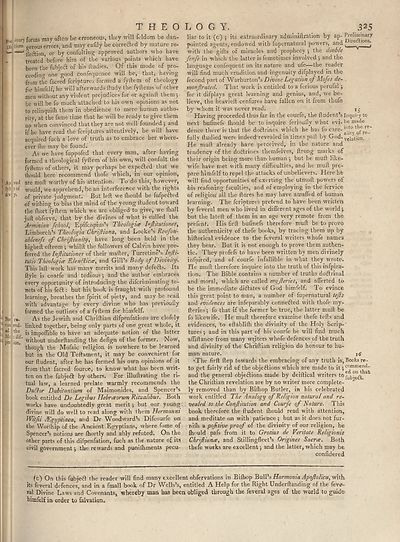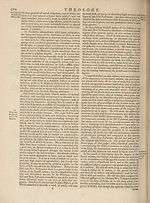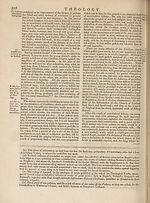Encyclopaedia Britannica, or, a Dictionary of arts, sciences, and miscellaneous literature : enlarged and improved. Illustrated with nearly six hundred engravings > Volume 20, SUI-ZYM
(367) Page 325
Download files
Complete book:
Individual page:
Thumbnail gallery: Grid view | List view

Pre
l)ii
Ap
fyit
div.
con
! 6i^
:M<
per
T H E O
,inary forms may often be erroneous, they will feldom be dan-
tions. p.erous errors, and may eafily be correaed by mature re-
deftion, or by confulting approved authors who have
treated'before him of the various points which have
been the fubjea of his ftudies. Of this mode of pro¬
ceeding one good confequence will be, that, having
from the facred feriptures formed a fyftem of theology
for himfelf, he will afterwards ftudy the fyftems of other
men without any violent prejudices for or againft them;
he will be fo much attached to his own opinions as not
to relinquilh them in obedience to mere human autho¬
rity, at the fame time that he will be ready to give them
up when convinced that they are not well founded ; and
if he have read the feriptures attentively, he will have
acquired fuch a love of truth as to embrace her where-
ever (lie may be found.
As we have fuppofed that every man, after having
formed a theological fyftem of his own, will confult the
fyftems of others, it may perhaps be expefted that we
(hould here recommend thofe which, in our opinion,
ved are moft worthy of his attention. I o do this, however,
5would, we apprehend, be an interference with the rights
of private judgment. But left we ihould be fufpe&ed
of wilhing to bias the mind of the young ftudent toward
the ftiort fyftem which we are obliged to give, we ftiall
juft obferve, that by the divines of what is called the
Arminian fchool, Epifcopius’s Theologur Injlituttones,
Limborch’s Theologta Chrijliana, and Locke’s Reajon-
ablenefs of ChriJUanity, have long been held in the
higheft efteem ; whilft the followers of Calvin have pre¬
ferred the Injlitutiones of their matter, Turretine’s Infti-
tutio Theologice Klenchcce, and Gill’s Body oj Divinity.
This laft work has many merits and many defers. Its
ftyle is coarfe and tedious 5 and the author embraces
every opportunity of introducing the diferiminating te¬
nets of his fed : but his book is fraught with profound
learning, breathes the fpirit of piety, and may be read
with advantage by every divine who has previoufly
formed the outlines of a fyftem for himfelf.
j». As the Jewifti and Chriftian difpenfations are elofely
:nd- linked together, being only parts of one great whole, it
t^?, is impoflible to have an adequate notion of the latter
without underftanding the defign of the former. Now,
though the Mofaic religion is nowhere to be learned
but in the Old Teftament, it may be convenient for
our ftudent, after he has formed his own opinions of it
from that facred fource, to know what has been writ¬
ten on the fubje£t by others. For illuftrating the ri¬
tual law, a learned prelate warmly recommends the
Dufflor Dubitnntium of Maimonides, and Spencer’s
book entitled De Legibus Hebrceorum Rituahbus. Both
works have undoubtedly great merit j but our young
divine will do well to read along with them Hermanni
Witfii JEgyptiaca, and Dr Woodward’s Difcourfe on
the Worthip of the Ancient Egyptians, where feme of
Spencer’s notions are (hortly and ably refuted. On the
other parts of this difpenfation, fuch as the nature of its
civil government j the rewards and puniftiments pecu-
LOGY. 325
liar to it (c) ; its extraordinary adminiftration by ap- Preliminary
pointed agents, endowed with fupernatural powers, and Pue lonsl
with the gifts of miracles and prophecy the double
fenfe in which the latter is fometimes involved •, and the
language confequent on its nature and ufe^—the reader
will find much erudition and ingenuity difplayed in the
fecond part of Warburton’s Divine Legation of Mofes de- .
monftrated. That work is entitled to a ferious perufal $
for it difplays great learning and genius, and, we be¬
lieve, the heavieft cenfures have fallen on it from thofe
by whom it was never read. ' 1;
Having proceeded thus far in the courfe, the ftudent’sInquiry to
next bufinefs {hould be to inquire ferioufty what evi-bemade
deuce there is that the doftrines which he has fo care- ^'[t°
fully ftudied were indeed revealed in times paft by God. Y^tion.
Tie muft already have perceived, in the nature and
tendency of the do&rines themfelves, ftrong marks of
their origin being more than human ; but he muft like-
wife have met with many difficulties, and he muft pre¬
pare himfelf to repel the attacks of unbelievers. Here he
will find opportunities of exerting the utmoft powers of
his reafoning faculties, and of employing in the fervice
of religion all the ftores he may have amaffed of human
learning. The feriptures pretend to have been written
by feveral men who lived in different ages of the world j
but the lateft of them in an age very remote from the
prefect. His firft bufinefs therefore muft be to prove
the authenticity of thefe books, by tracing them up by
hiftorical evidence to the feveral writers whofe names
they bear. But it is not enough to prove them authen¬
tic. They profefs to have been written by men divinely
infpired, and of eourfe infallible in what they wrote.
He muft therefore inquire into the truth of this infpira-
tion. The Bible contains a number of truths doflrinal
and moral, which are called myjleries, and afferted to
be the immediate diftates of God himfelf. To evince
this great point to man, a number of fupernatural tefs
and evidences are infeparably connefted with thofe my-
fteries; fo that if the former be true, the latter muft be
fo likewife. He muft therefore examine thefe tefts and
evidences, to eftablifh the divinity of the Holy Scrip¬
tures ; and in this part of his courfe be will find much
affiftance from many waiters whofe defences of the truth
and divinity of the Chriftian religion do honour to hu¬
man nature. 16
-The firft ftep towards the embracing of any truth is, Books re-.
to get fairly rid of the objections which are made to it •commencE
and the general objections made by deiftical writers to^- ^
the Chriftian revelation are by no writer more complete¬
ly removed than by Bifhop Butler, in his celebrated
work entitled The Analogy of Religion natural and re¬
vealed to the Conjiitution and Courfe of Nature. This
book therefore the ftudent fhoukt read with attention,
and meditate on with patience 5 but as it does not fur-
nifh a poftive proof of the divinity of our religion, he
fhould pafs from it to Grotius de Ventate Religionis
Chrjliunce, and Stillingfleet’s Origines Saerce. Both
thefe works are excellent j and the latter, which may be
confidered
(c) On this fubj-eCf the reader will find many excellent obfervations in Bifhop ’BxAVs Harmonia ApoJlo/ica,w\\h.
its feveral defences, and in a fmall book of Dr Wells’s, entitled A Help for the Right Underftanding of the feve¬
ral Divine Laws and Covenants, whereby man has been obliged through the feveral ages of the world to guide
himfelf in order to falvation.
l)ii
Ap
fyit
div.
con
! 6i^
:M<
per
T H E O
,inary forms may often be erroneous, they will feldom be dan-
tions. p.erous errors, and may eafily be correaed by mature re-
deftion, or by confulting approved authors who have
treated'before him of the various points which have
been the fubjea of his ftudies. Of this mode of pro¬
ceeding one good confequence will be, that, having
from the facred feriptures formed a fyftem of theology
for himfelf, he will afterwards ftudy the fyftems of other
men without any violent prejudices for or againft them;
he will be fo much attached to his own opinions as not
to relinquilh them in obedience to mere human autho¬
rity, at the fame time that he will be ready to give them
up when convinced that they are not well founded ; and
if he have read the feriptures attentively, he will have
acquired fuch a love of truth as to embrace her where-
ever (lie may be found.
As we have fuppofed that every man, after having
formed a theological fyftem of his own, will confult the
fyftems of others, it may perhaps be expefted that we
(hould here recommend thofe which, in our opinion,
ved are moft worthy of his attention. I o do this, however,
5would, we apprehend, be an interference with the rights
of private judgment. But left we ihould be fufpe&ed
of wilhing to bias the mind of the young ftudent toward
the ftiort fyftem which we are obliged to give, we ftiall
juft obferve, that by the divines of what is called the
Arminian fchool, Epifcopius’s Theologur Injlituttones,
Limborch’s Theologta Chrijliana, and Locke’s Reajon-
ablenefs of ChriJUanity, have long been held in the
higheft efteem ; whilft the followers of Calvin have pre¬
ferred the Injlitutiones of their matter, Turretine’s Infti-
tutio Theologice Klenchcce, and Gill’s Body oj Divinity.
This laft work has many merits and many defers. Its
ftyle is coarfe and tedious 5 and the author embraces
every opportunity of introducing the diferiminating te¬
nets of his fed : but his book is fraught with profound
learning, breathes the fpirit of piety, and may be read
with advantage by every divine who has previoufly
formed the outlines of a fyftem for himfelf.
j». As the Jewifti and Chriftian difpenfations are elofely
:nd- linked together, being only parts of one great whole, it
t^?, is impoflible to have an adequate notion of the latter
without underftanding the defign of the former. Now,
though the Mofaic religion is nowhere to be learned
but in the Old Teftament, it may be convenient for
our ftudent, after he has formed his own opinions of it
from that facred fource, to know what has been writ¬
ten on the fubje£t by others. For illuftrating the ri¬
tual law, a learned prelate warmly recommends the
Dufflor Dubitnntium of Maimonides, and Spencer’s
book entitled De Legibus Hebrceorum Rituahbus. Both
works have undoubtedly great merit j but our young
divine will do well to read along with them Hermanni
Witfii JEgyptiaca, and Dr Woodward’s Difcourfe on
the Worthip of the Ancient Egyptians, where feme of
Spencer’s notions are (hortly and ably refuted. On the
other parts of this difpenfation, fuch as the nature of its
civil government j the rewards and puniftiments pecu-
LOGY. 325
liar to it (c) ; its extraordinary adminiftration by ap- Preliminary
pointed agents, endowed with fupernatural powers, and Pue lonsl
with the gifts of miracles and prophecy the double
fenfe in which the latter is fometimes involved •, and the
language confequent on its nature and ufe^—the reader
will find much erudition and ingenuity difplayed in the
fecond part of Warburton’s Divine Legation of Mofes de- .
monftrated. That work is entitled to a ferious perufal $
for it difplays great learning and genius, and, we be¬
lieve, the heavieft cenfures have fallen on it from thofe
by whom it was never read. ' 1;
Having proceeded thus far in the courfe, the ftudent’sInquiry to
next bufinefs {hould be to inquire ferioufty what evi-bemade
deuce there is that the doftrines which he has fo care- ^'[t°
fully ftudied were indeed revealed in times paft by God. Y^tion.
Tie muft already have perceived, in the nature and
tendency of the do&rines themfelves, ftrong marks of
their origin being more than human ; but he muft like-
wife have met with many difficulties, and he muft pre¬
pare himfelf to repel the attacks of unbelievers. Here he
will find opportunities of exerting the utmoft powers of
his reafoning faculties, and of employing in the fervice
of religion all the ftores he may have amaffed of human
learning. The feriptures pretend to have been written
by feveral men who lived in different ages of the world j
but the lateft of them in an age very remote from the
prefect. His firft bufinefs therefore muft be to prove
the authenticity of thefe books, by tracing them up by
hiftorical evidence to the feveral writers whofe names
they bear. But it is not enough to prove them authen¬
tic. They profefs to have been written by men divinely
infpired, and of eourfe infallible in what they wrote.
He muft therefore inquire into the truth of this infpira-
tion. The Bible contains a number of truths doflrinal
and moral, which are called myjleries, and afferted to
be the immediate diftates of God himfelf. To evince
this great point to man, a number of fupernatural tefs
and evidences are infeparably connefted with thofe my-
fteries; fo that if the former be true, the latter muft be
fo likewife. He muft therefore examine thefe tefts and
evidences, to eftablifh the divinity of the Holy Scrip¬
tures ; and in this part of his courfe be will find much
affiftance from many waiters whofe defences of the truth
and divinity of the Chriftian religion do honour to hu¬
man nature. 16
-The firft ftep towards the embracing of any truth is, Books re-.
to get fairly rid of the objections which are made to it •commencE
and the general objections made by deiftical writers to^- ^
the Chriftian revelation are by no writer more complete¬
ly removed than by Bifhop Butler, in his celebrated
work entitled The Analogy of Religion natural and re¬
vealed to the Conjiitution and Courfe of Nature. This
book therefore the ftudent fhoukt read with attention,
and meditate on with patience 5 but as it does not fur-
nifh a poftive proof of the divinity of our religion, he
fhould pafs from it to Grotius de Ventate Religionis
Chrjliunce, and Stillingfleet’s Origines Saerce. Both
thefe works are excellent j and the latter, which may be
confidered
(c) On this fubj-eCf the reader will find many excellent obfervations in Bifhop ’BxAVs Harmonia ApoJlo/ica,w\\h.
its feveral defences, and in a fmall book of Dr Wells’s, entitled A Help for the Right Underftanding of the feve¬
ral Divine Laws and Covenants, whereby man has been obliged through the feveral ages of the world to guide
himfelf in order to falvation.
Set display mode to:
![]() Universal Viewer |
Universal Viewer | ![]() Mirador |
Large image | Transcription
Mirador |
Large image | Transcription
Images and transcriptions on this page, including medium image downloads, may be used under the Creative Commons Attribution 4.0 International Licence unless otherwise stated. ![]()
| Permanent URL | https://digital.nls.uk/192279318 |
|---|
| Description | Plates 516, 519 and 520 missing. |
|---|---|
| Attribution and copyright: |
|
| Description | Ten editions of 'Encyclopaedia Britannica', issued from 1768-1903, in 231 volumes. Originally issued in 100 weekly parts (3 volumes) between 1768 and 1771 by publishers: Colin Macfarquhar and Andrew Bell (Edinburgh); editor: William Smellie: engraver: Andrew Bell. Expanded editions in the 19th century featured more volumes and contributions from leading experts in their fields. Managed and published in Edinburgh up to the 9th edition (25 volumes, from 1875-1889); the 10th edition (1902-1903) re-issued the 9th edition, with 11 supplementary volumes. |
|---|---|
| Additional NLS resources: |
|

